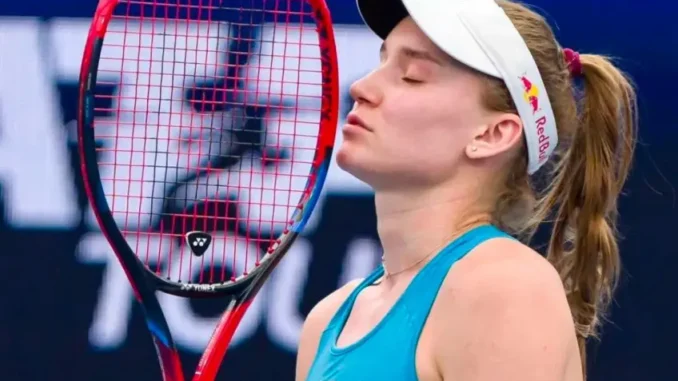
Rennae Stubbs, the former tennis star turned commentator, has delivered a striking reality check to Elena Rybakina as scrutiny grows around her coach Stefano Vukov amid an ongoing investigation into his behavior. Stubbs’ comments shed light on the delicate dynamics between players and their coaches, as well as the challenges elite athletes face when making critical decisions about their support teams.
The situation arose after Vukov, Rybakina’s coach, was accused of exhibiting behavior that some interpreted as overly harsh and unprofessional during matches. Videos circulating online showed moments where Vukov appeared visibly frustrated, leading to criticism from tennis fans and commentators alike. While such intensity is not uncommon in the high-pressure world of professional sports, the allegations have sparked a broader conversation about the boundaries of coaching behavior and player well-being.
Stubbs, known for her candid analysis and deep understanding of the sport, did not hold back when discussing the matter. Addressing Rybakina directly, Stubbs emphasized the importance of evaluating the dynamics within her team and not turning a blind eye to potential issues. “At the end of the day,” Stubbs remarked, “your coach works for you, not the other way around. If something isn’t right, it’s on you to address it.”
Stubbs’ comments serve as a powerful reminder of the agency players hold in shaping their careers. While coaches play a pivotal role in guiding athletes to success, the ultimate responsibility for maintaining a healthy and productive working relationship falls on the player. In Rybakina’s case, Stubbs suggested that it might be time for the Kazakh star to take a closer look at whether Vukov’s approach aligns with her goals and values.
Rybakina has been one of the standout performers on the WTA Tour in recent years, rising to prominence with her powerful baseline game and calm demeanor under pressure. Her success, highlighted by her Wimbledon triumph in 2022, has been accompanied by a growing spotlight on her team, particularly Vukov. The coach has been credited with helping Rybakina refine her game and develop the mental toughness needed to compete at the highest level. However, the recent controversy has cast a shadow over their partnership.
The investigation into Vukov’s conduct has further intensified the scrutiny. While the details of the probe remain unclear, the situation has opened a larger discussion about the standards to which coaches should be held. Stubbs pointed out that the relationship between a player and coach is inherently unique, often involving a level of intensity and passion that can blur the lines between constructive criticism and outright hostility.
Stubbs, who enjoyed a successful doubles career and has worked as a coach herself, acknowledged the challenges that come with balancing authority and empathy in a coaching role. “It’s not an easy job,” she said. “You’re there to push your player to be their best, but you also have to know where to draw the line. Respect is key, and without it, the whole dynamic falls apart.”
For Rybakina, the current situation poses a significant challenge. On one hand, her partnership with Vukov has yielded impressive results, and disrupting that relationship could potentially affect her momentum. On the other hand, staying in a situation that might not be conducive to her long-term well-being could have equally detrimental effects. Stubbs emphasized that while success on the court is important, it should never come at the expense of a player’s mental and emotional health.
The tennis world has seen numerous examples of players reevaluating their coaching arrangements to great effect. For instance, Naomi Osaka made headlines when she parted ways with her coach Sascha Bajin despite a string of successes, citing the need for a more supportive environment. Similarly, Andy Murray’s decision to work with Amélie Mauresmo was driven by his desire for a fresh perspective and a more collaborative approach.
Rybakina now finds herself at a crossroads, with the spotlight on her every move. As the investigation into Vukov continues, the outcome could influence not only their partnership but also broader conversations about coaching ethics in professional tennis. Stubbs urged Rybakina to take control of her narrative, reminding her that players have the power to shape the culture of their teams.
Fans and analysts alike are keenly watching how Rybakina will handle the situation. Her poise and professionalism on the court suggest she is more than capable of navigating the challenges that come with being a top-ranked player. However, the pressures of elite sport can be relentless, and decisions made in the heat of the moment often carry long-term consequences.
Stubbs’ reality check to Rybakina extends beyond her individual case, resonating with athletes across all levels of competition. The message is clear: while coaches play an integral role in shaping a player’s career, the relationship must be rooted in mutual respect and shared values. When these foundations are missing, even the most successful partnerships can become unsustainable.
For Rybakina, the coming weeks will likely be pivotal. Whether she chooses to continue working with Vukov or seeks a new direction, the decision will undoubtedly be closely scrutinized. Regardless of the outcome, Stubbs’ advice serves as a valuable reminder of the power and responsibility players have in defining their careers. As Rybakina continues her journey in the world of tennis, her ability to manage such challenges will only further solidify her status as a true professional and a role model for others.
Leave a Reply